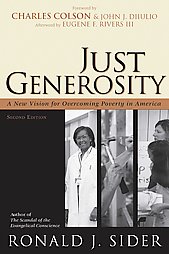 The first part of this chapter lays out a framework within which the author operates. The second part which will follow in the next post, lays out the overwhelming evidence for Christ's concern for the poor and not only the people, but the systems that oppress them.
The first part of this chapter lays out a framework within which the author operates. The second part which will follow in the next post, lays out the overwhelming evidence for Christ's concern for the poor and not only the people, but the systems that oppress them.Assumed is the fact that he is an Evangelical that takes the Bible very seriously. This then is how he views God's hand in creation and the ways in which God involves humans.
Among evangelicals there are essentially two views of the created order. Ask yourself, "do I think the world is created by God, but fallen. (i.e. sinful) Or fallen, but created by God." Sider operates with the latter view. My own view, not surprisingly, follows closely to Sider's. I do have some questions about the scriptural passages that describe the end of the world. However I think the ones that describe the final exaltation of Christ and his creation, a new heaven and a new earth, are entirely too forgotten by evangelicals.
Again, what follows is an outline of the first part of chapter 2 in my own words, except where there are quotation marks.
A Conceptual Framework
The Lord of Economics
We are merely stewards of our possessions. As scripture says, we can not worship both God and mammon. "As Lord of history, God works now, with and through human co-workers, to create more wholesome economies that respect and nurture the dignity and worth of every human being."
The Importance of the World and History
"Many modern secular thinkers absolutize the historical process, even while they pronounce it meaningless. Some Eastern thinkers consider the world an illusion to escape. Some Christians to almost the same thing, viewing earthly life as mere preparation for eternity. Take for instance, the old gospel song, ‘This world is not my home I’m just passing through’."
In contrast, the Bible speaks of creation being restored (Rom 8:19-23) and of the glory of the nations (culture) being brought into the New Jerusalem. (Rev 11:15)
The Nature of Persons
Each person and all of humanity is of an infinitesimal value. Consequently all theories of economics must subordinate themselves to humanity.
We must recognize the freedom inherent in each individual, and the solidarity and the communal nature of humanities shared experiences, locally and globally. “Because our communal nature demands attention to the common good, individual rights, whether of freedom of speech or private property, can not be absolute. The right to private property dare not undermine the general welfare. Only God is an absolute owner. We are merely stewards called to balance personal rights with the common good.
These truths make the exploitation of our fellow humans absolutely wrong. This exploitation can take both overt and passive forms.
The Creation of Wealth
Wealth is a gift from God. Creativity, including the creation of wealth, is one way we reflect the nature of God back to him. How we create wealth, and what we do with it - there in lies the challenge.
The Glory of Work
As God worked so should we, again this is a way we reflect his nature back to him, an act of worship. Laziness is one (on a long list) of reasons people are poor. On the other hand, too much work constitutes evil as well. Be it forced, in the form of slavery or an economy that requires a terrible number of hours worked just to earn a living wage. Or chosen, the common challenge of being a workaholic.
The Reality of Sin
This is the kicker. Everything is marred by sin. There is nothing it doesn't touch, because there is nothing that humanity does not touch. Only when Christ returns will things be completely restored to the way they were created to be. However, that does not mean that that this planet is nothing but a cesspool. Quite the contrary. Ever since the fall, God has been at work restoring this world, humanity and culture, to the way it ought to be, and using humanity to do it.
No comments:
Post a Comment